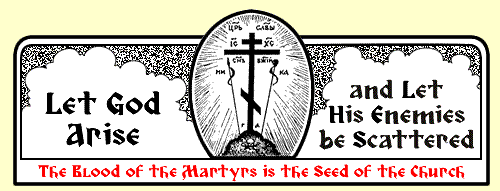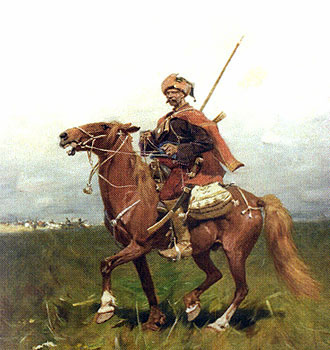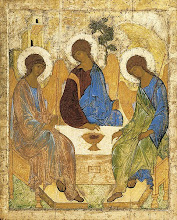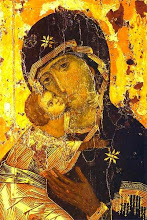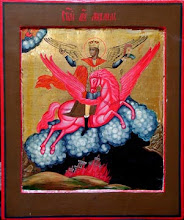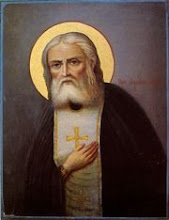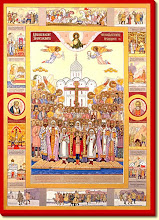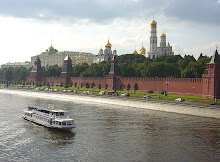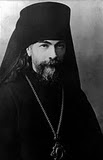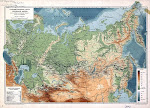 OCA Holy Synod of Bishops blesses Joint Statement of OCA, ROCOR Commissions
OCA Holy Synod of Bishops blesses Joint Statement of OCA, ROCOR CommissionsPosted 12/14
SYOSSET, NY [OCA] -- At their fall session held at the Chancery of the Orthodox Church in America here November 16-18, 2010, the members of the Holy Synod of Bishops gave their blessing to the Joint Statement of the Commissions of the Orthodox Church in America and the Russian Orthodox Church Outside of Russia, titled "Relations Between the Orthodox Church in America and the Russian Orthodox Church Outside of Russia.
The Joint Statement was drafted by members of the OCA and ROCOR Commissions at a their meeting in Sea Cliff, NY October 5-6, 2010. [See http://www.oca.org/news/2289 and http://www.oca.org/news/2285 for background information.] The text was submitted to, and received the blessing of, the OCA and ROCOR hierarchs.
The text of the Joint Statement reads as follows.
 Relations between the Orthodox Church in America and the Russian Orthodox Church Outside of Russia
Relations between the Orthodox Church in America and the Russian Orthodox Church Outside of RussiaJoint Statement of the Commissions
of the Orthodox Church in America and the Russian Orthodox Church Outside of Russia
+
October 5-6, 2010
The Orthodox Church in America (OCA) and the Russian Orthodox Church Outside of Russia (ROCOR) share a single origin – the local Church of Russia – and a long history on the North American continent. It was the Russian Church that first sent missionaries to America, established the first parishes, sent the first bishops and established the first dioceses. Prior to the Bolshevik Revolution, the North American Diocese of the Russian Church was the principal canonical ecclesiastical authority here, and although there were clergy and parishes of differing cultures and languages, many were in the archpastoral care of the bishop of the Russian Orthodox Church. Therefore, there is no question that the formation of multiple jurisdictions on this continent was largely due to the ecclesiastical chaos that ensued after the Revolution of 1917.
The life and witness of the Russian Orthodox Church in the 20th century was marked by violent persecution at the hands of the totalitarian atheist Bolshevik regime brought to power by the communist revolutionaries in 1917. The decades of persecution included the martyrdom of bishops, priests, monastics, and lay people in overwhelming numbers and in numerous killing fields and gulags. Thousands of churches and monasteries were desecrated and destroyed. The voice of the church was silenced in the public arena. Charitable and educational ministries were made illegal. In the midst of massive anti-religious campaigns and by means of unjust laws religious believers, both clergy and lay, were deprived of their rights and put on the margins of society as objects of derision and discrimination.
The decades of persecution were a time of human suffering and genocidal cruelty. These years were also a time of witness to Christ and faithfulness unto death. What the Russian Orthodox Church endured during Soviet rule affected Church life outside Russia.
In the Diocese of the Aleutians and North America, the loss of contact with the Church of Russia and the loss of support from Russia created confusion and even chaos in the midst of uncertainty. From this turmoil emerged the Russian Orthodox Greek Catholic Church in America (popularly known as the North American Metropolia), which is today the Orthodox Church in America.
For the millions of refugees fleeing from revolution and civil war in Russia and settling in the Balkans and Western Europe, in Asia and the Americas and Australia, there was need to find comfort and support within Church life under new circumstances.
With regard to the situation of the clergy and parishes of the Russian Church that were found abroad, there were two distinct directions that evolved. The first was the striving for a unified central Church Administration which could oversee the ecclesiastical life abroad until conditions would change in the homeland and the Patriarchate, independent of Soviet control, could be restored. The second was the striving toward the establishment of a completely independent self-administered Orthodox Church in North America.
These two directions are the essence of the conflict between the bishops, clergy and parishes which would become the Orthodox Church in America and the bishops, clergy and parishes which would remain part of a central Russian Orthodox Church Outside of Russia.
However, even after the rupture of relations that occurred at the 7th All American Sobor in 1946, there were periods of close collaboration and mutual support between the North American Metropolia and the Russian Orthodox Church Outside of Russia. Even when the close collaboration faltered, support and welcome to the Russian Orthodox Church Outside of Russia was offered by the American Metropolia in the period when the Synod of ROCOR bishops moved from Europe to the United States.
On December 11, 1950, a joint meeting of the Metropolitans Anastassy and Leonty and bishops of the Metropolia and ROCOR was held in New York. As noted in the official Minutes of ROCOR’s Council of Bishops, the Metropolia and ROCOR hierarchs had during their meeting “unanimously recognized that the sad fact of ecclesiastical separation causes significant damage to the holy cause of Christ’s Church: it weakens the preaching of Orthodoxy, undermining Church discipline and a sense of responsibility among clergy of the Church, is a temptation for the faithful, diminishes the prestige of the Church in the heterodox world and makes more difficult its struggle with militant atheism. It was unanimously determined that the Church's unity is necessary.”
Those Minutes also note that: “after the discussion of practical ways for achieving Church unity the hierarchs of the Russian Orthodox Church Outside of Russia in conjunction with the bishops of the American Metropolitan See, accordingly recognized that the most appropriate path for that time was the preservation of the existing organizations of the Russian Orthodox Church Outside of Russia and the American Metropolia, which will exist in parallel, but will be in close fraternal cooperation between themselves, periodically calling meetings of hierarchs of both Church organizations to resolve common or contentious issues with a firm hope that further ways to more closely achieve canonical unity with God's help will be provided by life itself.”
After the meeting of the two first hierarchs and members of their Synods, the Great Council of Bishops of the North American Metropolia issued an Archpastoral Epistle dated December 2/15, 1950, which included the following statement:
“Let enmity between brothers be abolished and let mutual respect be established on the basis of our mutual acceptance of the co-existence of two paths for the Church in this country, one permanent and one temporary, which are the result of the exceptional sufferings of our time, full of terrible events, and forebodings, imperiously demanding from all the greatest submission to the Lord, the greatest brotherly love and moral support for each other. This does not break, but further strengthens the historical path of our Metropolia.
“What happened after the close of the Council on December 11, i.e. Metropolitan Anastassy twice visiting our newly elected primate at the Holy Protection Cathedral, and the talk that we bishops had which took place the same evening with the hierarchs of the Russian jurisdiction Outside of Russia who visited us, determines the possibility of peaceful life in parallel, subject to internal mutual respect and clear delineation of our canonical rights and historical foundations. The Russian Church Outside of Russia has its own flock in America as well. She has spread her wanderers’ tent in this country, too. Let the peace of God be with its zealous hierarchs, its kind shepherds and its laity!
 “Let brotherly love prevail, and let mutual forgiveness of past wrongs be accomplished. The American Metropolia wishes to live in peace with these brethren as well, based on the temporary presence of their hierarchical administration on the territory of America until the future free All-Russian Local Council.
“Let brotherly love prevail, and let mutual forgiveness of past wrongs be accomplished. The American Metropolia wishes to live in peace with these brethren as well, based on the temporary presence of their hierarchical administration on the territory of America until the future free All-Russian Local Council.“No treaties or agreements protect this decision of our Church coexistence. It rests upon the requirements of life itself and the clear precepts of the Savior: "By this shall all men know that you are My disciples, if ye have love for one another" (John 13:35).
“The clear and unconditional definition of our own canonical path, made at the 8th All-American Sobor, requires us to have an attitude of brotherly love toward those who, while wishing to preserve their temporarily separate ecclesiastical administrative organization next to ours, are our brothers in Christ.”
Despite these mutual efforts toward establishing brotherly relations, the paths of the Church Outside of Russia and the American Metropolia continued to be separate.
 In 1970, by recognizing the self-governing status of the Metropolia with the granting of the Tomos of Autocephaly, eucharistic communion between the Russian Orthodox Church (Moscow Patriarchate) and the American Metropolia was restored and reconciliation was achieved.
In 1970, by recognizing the self-governing status of the Metropolia with the granting of the Tomos of Autocephaly, eucharistic communion between the Russian Orthodox Church (Moscow Patriarchate) and the American Metropolia was restored and reconciliation was achieved.At the beginning of the 21st century, the deep and extensive changes in Russia with the renewal of church life, the restoration of thousands of churches and monasteries, the freedom to bear public witness to the Gospel in Russian society, a process of dialogue between ROCOR and the Moscow Patriarchate led to the restoration of canonical unity through the Act of Canonical Communion in 2007.
It is now time for the Orthodox Church in America and the Russian Orthodox Church Outside of Russia to declare together in the spirit of mutual repentance and mutual forgiveness that we are committed to living together as brothers in Christ and as sister Churches, and to sharing a common witness to the Gospel of Christ and the Holy Orthodox Faith. This common witness should most clearly and most fully be expressed in eucharistic communion.
In addition, we see the need to work together in harmony on joint projects, such as pastoral education, parish schools, student outreach, translations of services, ministering to the poor and needy, and missionary efforts. To work in harmony we will need to reflect together on theological, pastoral, and liturgical issues which we face in our ministry in North America. We also affirm the need to examine together and develop a common understanding of the historical record concerning our churches. These hopes and endeavors can be encouraged and advanced through periodic meetings of our first hierarchs, bishops, clergy and laity to discuss matters of mutual concern, including those theological, liturgical and pastoral issues.
We are committed to the processes and goals expressed in the Chambesy accords of June 2009, specifically the active participation of both our Churches in the regional Episcopal Assembly as we strive to achieve Orthodox unity on this continent.
The following text from the Epistle of the Holy Apostle Paul to the Ephesians is addressed to us, and therefore to the believers of the Orthodox Church in America and the Russian Orthodox Church Outside of Russia: “I … beseech you to walk worthy of the calling with which you were called, with all lowliness and gentleness, with longsuffering, bearing with one another in love, endeavoring to keep the unity of the Spirit in the bond of peace. There is one body and one Spirit, just as you were called in one hope of your calling; one Lord, one faith, one Baptism, one God and Father of all, who is above all and through all and in you all” (Ephesians 4: 1-6).
 We ask for the intercession and blessing of the Holy Hierarch Tikhon, Patriarch and Confessor of Moscow and Enlightener of North America and all the saints who have shone forth on this continent as we labor “for the equipping of the saints for the work of ministry, for the edifying of the body of Christ” (Ephesians 4: 12).
We ask for the intercession and blessing of the Holy Hierarch Tikhon, Patriarch and Confessor of Moscow and Enlightener of North America and all the saints who have shone forth on this continent as we labor “for the equipping of the saints for the work of ministry, for the edifying of the body of Christ” (Ephesians 4: 12).OCA Commission
Bishop TIKHON of Philadelphia
and Eastern Pennsylvania (Chair)
Archpriest Leonid Kishkovsky
Archpriest Alexander Garklavs
Archpriest John Erickson
Igumen Alexander (Pihach)
Alexis Liberovsky (consultant) ROCOR Commission
Bishop GEORGE of Mayfield (Chair)
Archimandrite Luke (Murianka)
Archpriest Alexander Lebedeff
Archpriest David Moser
Priest Peter Jackson
Archpriest Seraphim Gan (consultant)
A Russian translation of the text may be found at http://www.synod.com/synod/2010/12rocorocastatement.html."
--------------------------------------------------------------------------------
http://www.oca.org/news/2353
 Tserkovnye Vekhi Responds:
Tserkovnye Vekhi Responds:Christ is Born! Give Ye Him Glory!
Beloved Brothers & Sisters in Christ,
We should be thankful to the Mother Church for coordinating this new era of pan-Russian Orthodox unity in North America. Such events as the restoration of Communion between Russian Orthodox brothers are blessed occurences, even when the auspices and personages associated with these events are less than ideal. While such an event inspires us to not only support such a step at unity but to broaden its scope to include other jurisdictions functioning in North America. Great opportunities for the Russian Orthodox mission await.
As a rejoinder to the OCA commentary on this joyous occasion, it is necessary to note that, no, the FICTION of an OCA feverishly seeking to derussify itself and create an American fiction out of a Russian (or post Russian) immigrant reality is shockingly appalling to read "as an official history" here YET AGAIN. While it is true that the ultimate goal of the Russian mission was and is A NORTH AMERICAN LOCAL CHURCH (As opposed to an "autocephaly" seemingly annulled with the latest concordats with the Phanariots), it must be reiterated that these things don't artificially transpire or "spontaneously coalesce by a fiat declared in conjuncition with Nikodimites" but are the result of a natural process of RETENTION of the core of believers of ones missions and the broadening of their ranks with native populations (and generations) on the missionary territory on which they function.
Disparaging RUSSIAN HERITAGE MUST STOP IMMEDIATELY IN THE OCA, and this occasion should be taken to not only ratify a better relationship with ROCOR but with the entire RUSSIAN Orthodox (AND "Orthodox Traditionalist" or "Authentic" or "Catacomb" or "Old Rite," etc.) immigrant community, within and without the OCA, to express regrets for the disturbingly unwarranted "Americanizations" which only engendered the most myopic of russophobias and created a climate of alienation which has resulted in the nullification OF THE MISSIONARY ROLE the Mother Church has assigned to its NORTH AMERICAN DAUGHTER. Loss of ones core of believers and 80%+ (and still declining!) of its membership is something for the OCA to lament and overcome. An embarassing era of OCA "nativism" has cost the Orthodox mission in this nation, on this continent, and it must be addressed satisfactorily if the OCA is to survive.
 With ROCOR, many historical issues of cessation of intercommunion with the OCA still remain in regularizing the North American mission:
With ROCOR, many historical issues of cessation of intercommunion with the OCA still remain in regularizing the North American mission:1). Renovationism, liturgical, canonical, theological, Patristic, Scriptual and otherwise. It must be cemented in the minds of all THAT THE SEVENTH ECUMENICAL COUNCIL SPECIFICALLY ANATHEMIZES ALL INNOVATIONS (it also condemns musical instruments in Orthodox worship).
2). Ecumenism and sectarian "dialogues" with the heterodox which have resulted in HERETICAL ecclesiological "concordats," crypto-Uniatism (Something the OCA was initially created to combat), HERETICAL ecclesiologies and endorsements of such SECTARIAN documents as the WCC's BEM, and a general denominationalist approach to Orthodox identity and purpose in North America. It is not without reason that the OCA has blunted its message and become BANAL in proferring a model of an "ACCEPTED POST RUSSIAN AMERICAN (RUSSOPHOBIC) DENOMINATION" "adapting to the American religious mainstream" which SECTARIANs like Fr. Kishkovsky (and Fr. LebedeV) envision as a "fellow denomination."
3). Not only a spiritual immaturity, but a total immaturity in approach to catechizing and churching both "cradle" and "convert" Orthodox Christians. The OCA as it has imploded has disastrously lost what resources and institutions it even had. Moreover, it remains a "post Russian" (not ethnically American!) body primarily as opposed to a LOCAL expression of Orthodoxy. There is no American Orthodoxy even in sight. Sadly, the OCA offers no acceptible paradigms for its advent.
4). New Calendarism. Lack of liturgical unity and rejection of the Holy Canons of Nicea for the ROBBER SYNOD of 1923, which even the Greek churches have in actuality abrogated (viz. RESTORATION OF THE JULIAN PASCHALION, REJECTION OF SECOND MARRIAGES FOR PRIESTS AND DEACONS AND A MARRIED EPISCOPATE, RETENTION OF BEARDS, CASSOCKS, ORTHODOX FASTING, FOREGOING DENIGRATION OF MONASTICISM, etc.) emphasizing that this 1923 Phanariot convention of Greek Renovationists is at best DUBIOUS by the very fact the Greek Robbers have themselves UNILATERALLY "uncanonically" altered and postponed its decisions. If they don't even respect their schismatic and heretical innovations, how can we?! There are no canonical grounds for the IMPOSITION of the Calendar Reform in the OCA while the fact the Mother Church retains the Orthodox Calendar makes this act at very least quasi-schismatic.
Yes, it is true that St. Tikhon felt it both possible and even necessary to implement a "new calendar" for Western missions, but when he learned the auspices of the way the current GREEK calendar reform was implemented, he ANNULLED the adoption of it by the Russian church and condemned it as "uncanonical" and an "INNOVATION WHICH PRECIPITATES SCHISM." The witness of such luminaries as St. Alexis Mechev is clear in relating the Russian church's reasons for non-adoption and condemnation of the GREEK calendar reform. The theological writing and acumen of St. Seraphim of Bulgaria cements it.
Likewise, the OCA with its first hierarchs from Metropolitan Platon to Metropolitan Leonty to even Metropolitan Ireney were at best "UNCOMFORTABLE" with the prospect of a calendar reform and generally patently opposed to it as something which "promoted unnecessary disharmony and divisions" (ie schism). It must be noted that when it was propagandized in the OCA in the late 1970s and early 1980s, that noteable hierarchs like the Bishops of S. Canaan and of Alaska openly called it "UNWARRANTED" and "SCHISM."
Thus its implementation has proven UNCANONICAL, SCHISMATIC, ruinous and unscrupulous in the OCA. It has failed in its stated goal of "Americanization." While honouring the American federal holiday of Christmas in nowise means that a given community becomes illegitimate in observing the Orthodox celebration of this Feast on the Orthodox Calendar. Such an observance does not necessarily embody a celebration of "two Christmases," but merely a broadening of what in the West is usually understood as a festive season of "Christmastime." Moreover, simply instructing parishes to be sensitive to Orthodox observance of the Nativity by OFFERING Christmas services on the 7, January AS WELL (at a minimum) in no wise causes acrimony with a Western religious custom which observes Christmas until the 6, January traditionally. One more day only preserves the joy and sacredness of Christmas in the West. If anything, with the rise of a new militant secularism in North America, it acts as a statement for Christ and Christmas and aids in reaffirming the sacredness of the Christmas season FOR ALL AMERICANs. Just as a variant Paschalion for Orthodox Christians exists without any great stress on the missionary witness of Orthodoxy, so too Orthodox observance of Christmas can only make it holier FOR ALL!
It must also be remembered that the US federal holiday DOES NOT RECOGNIZE THE DIVINITY OF CHRIST but merely honours Him (and Christmas) as a profound moral teacher with universal secular significance. That is all. Thus, the christological implications for associating Orthodox worship with artificial standards of such "patriotism" become shockingly evident. Arius would cringe.
It is understood that in all cases restoring the Orthodox Calendar (at least summarily) could indeed cause unnecessary upheavals in a thoroughly failed OCA. But gradual restoration (at least for the OCA "post Russian" dioceses) by episcopal observances and monastic mandates could provide a better approach to settling this unnecessary division. Dioceses and parishes should be generally allowed to return to the Orthodox Calendar while statements should be issued that 1). The Mother Church views the calendar innovation as too controversial to implement & 2). The Mother Church awaits resolution of this issue when a future Synod of Ecumenical Character can address it. THUS 3). Prudence is dictated in both having the OCA favour the Orthodox Calendar, its restoration, BUT as an act of pastoral economy, retention of the GREEK calendar reform can be observed by ECONOMY by communities who otherwise would become divided by its abolition. BUT the issue is not settled and awaits an Orthodox consensus.
5). Freemasonry in North America, although condemned by both the OCA and ROCOR (and the Russian church as a whole), should be better addressed and further rejected, especially when there are even hierarchical temptations and scandals which have arisen in regard to its evil influences and doctrine.
6). Both the OCA and ROCOR (and the Patriarchal /MP/ Administration) should use this occasion to restore a COMMON organism of North American Orthodox unity. While a Russian emphasis may indeed be at best only marginal in necessity today, a need for a Traditional Orthodox mission remains and needs to be reinvigorated in ONE institution. This institution must act and act quickly to normalize its missionary work, its work in catechesis and churching of American Orthodox.
 The Russian mission in North America needs to, yes, appreciate the historical identity of Russian Orthodoxy not as an "Eastern Slavic Orthodoxy" or phyletism, but a church at its outset which united Scandinavians (who ruled Rus'), Slavs (of all regionalisms), Finns, Balts, Khazars, Bulgars, Turks, Tartars, Avars (Hungarians), Roma, Caucasians even Germans in one common religious and cultural identity, respectful to the ethnic traditions of these people with a thrust to not "reinforce Russian cultural imperialism" but Rus' as a unifying center (post tribal, not at all "nationalist") affirming the fundamental Truth and doctrine of Orthodoxy AS THE ONE TRUE CHURCH.
The Russian mission in North America needs to, yes, appreciate the historical identity of Russian Orthodoxy not as an "Eastern Slavic Orthodoxy" or phyletism, but a church at its outset which united Scandinavians (who ruled Rus'), Slavs (of all regionalisms), Finns, Balts, Khazars, Bulgars, Turks, Tartars, Avars (Hungarians), Roma, Caucasians even Germans in one common religious and cultural identity, respectful to the ethnic traditions of these people with a thrust to not "reinforce Russian cultural imperialism" but Rus' as a unifying center (post tribal, not at all "nationalist") affirming the fundamental Truth and doctrine of Orthodoxy AS THE ONE TRUE CHURCH. That is what is fundamentally meant by Russian Orthodoxy (or its multi ethnic model which was observed in other historical churches such as the Church of Byzantium, Antioch, Alexandria, even Bulgaria). So Russian Orthodoxy IS NOT concerned with "preservation of the /Great/ Russian ethnos" but exists as a unifying force for disparate peoples in affirming Orthodoxy. In 988 AD, Rus' was a Russo-Scandinavian state, and multi-ethnic/cultural and lingual. So too an American outgrowth of Russian Orthodoxy as it is blessed by God and matures into a local church, which all of us Russian Orthodox in North America are called to accomplish TOGETHER. This means not an absorption into an ethnic Russian Orthodoxy, but, rather, an adaptation of its model of multi-ethnic unification and heritage. We need not be ashamed of SS Vladimir and Olga ever, Metropolitan Jonah! Nor do we need your venerations of Francis of Assisi, Therese of Lisieux or John of the Cross to be "legitimately" Western and Orthodox!
No, we need our OWN Cyrils and Methodiuses and our OWN holy rulers and ascetics and even martyrs and confessors HERE, ORTHODOX (not HERETICAL!) Saints. Metropolitan Jonah, Orthodoxy IS NOT CALLED TO SOME ECUMENIST AND "QUIET" UNIA /ANGLICAN COMPREHENSIVENESS/ AS YOU ADVOCATE AS AN UNCONVERTED SECTARIAN! Orthodoxy is called to be the ONE TRUE CHURCH FOR ALL MEN ALONE, the beauty, light, love and joy of the world.
Where Russian Orthodoxy is specifically a MORE FIT MODEL for America lies in the fact of its model of multi-ethnicity as opposed to the MODERN "neoGreek" model of cultural, political (and even racial) exclusivism. Yes, OCA propaganda was correct in assessing that cultural assimilation generationally makes ethnic subcultures unenduring paradigms BUT WRONG IN ASCRIBING THAT IDENTITY TO ITS RUSSIAN ORTHODOXY, ITS SHAME AT OUR COMMON HERITAGE. Thus, THE PRESCRIPTION OF THE AMERICANIZERS HAS DESTROYED THE OCA BASED ON AN IGNORANCE ROOTED IN A FALSE PREMISE. It is sad that most of the Americanizers in the OCA were at least partially of Russian heritage. Pathetic.
No, the ROCOR paradigm of a messianic diaspora is not realistic either. There is nothing fundamentally wrong with being Russian until it intrudes on being Orthodox and converting the communities which surround our parishes into Orthodoxy. No Orthodox Church, inner city or rural or in Fr. Meyendorff's "ethnic ghettoes," CAN BE PERMITTED TO CLOSE but must simply spread the light of Christ where it is shining and welcome all with a loving embrace, in Russian, Romanian, Ukrainian, or even English, Spanish, French or Vietnamese.
A common language has to be found for all, and a common language for theology, Patristics and liturgy must frame its basis. English (or Spanish) is the natural language of the majority and must be respected and presented in a dignified form in traditional worship. While the challenge of our seminaries and scholars is to forego Orthodoxy in Russian and Slavonic(Romanian/Serbian/Bulgarian, etc.) translation but to find a mode of instruction of Patristic Greek /Katherevousa/ in providing a universal tongue of scholarship and liturgy for our NATIVE Orthodoxy. Instead of Russo-Byzantinism, we are called to mature to an Amero-Byzantinism. There is nothing wrong with ethnic heritage, but we must realize that we are not building or restoring Russia (or any other faraway nation or empire). We are building and restoring Orthodoxy to the West and specifically to North America.
Thus we are called to consider ending ethnic divisions amongst the "jurisdictions" as well as overcoming "political" ones and continuing the work of ENDING the religious counterfeit of UNIA. That means calling what is left of certain communities to a COMMON and SHARED SINGLE mission in North American Orthodoxy:
1). Russians and Russian Dissidents.
2). Carpatho Russians, all Rusins.
3). Byelorussians.
4). Ukrainians (or "Little Russians").
But also:
5). Serbs.
6). Macedonians.
7). Bulgarians.
8). Albanians.
9). Romanians, Moldavians, Georgians, etc.
And also:
10). Uniates parasitizing Orthodox local churches and "jurisdictions" of every stripe. UNIA must be brought to an end, either by its TOTAL absorption by the Latins in its papal depravity or by the return of Uniates to the ONE TRUE CHURCH, Orthodoxy.
One church and ONE unity is necessary now, one TRADITIONAL AMERICAN LOCAL ORTHODOXY IN FORMATION. ONE NORTH AMERICAN LOCAL CHURCH.
While the approach of the Antiochians and their inclusion with us in ONE MISSION must be greeted with a special favour where 2nd., 3rd., 4th., 5th., 6th., etc. generations as well as new North American converts must be reached with a "kerygmatic" or "evangelical" activism coupled with traditional Orthodox churching and life. We aren't called to make America ethnic but to make America Orthodox and to frame a North American cultural and religious identity in Orthodoxy. The Antiochian approach can not only make us stronger but help us to reach those generationally lost for whatever reason and establish for us not only an "acceptance" but a "significance" and positive influence for all the peoples and governments of North America. A new symphonia and a more Apostolic model of Church-state interaction is not only necessary but possible for North America.
 These observations are written to appreciate the restored intercommunion between "branches of the Russian church" and tempered by a love of and well wishing for a common and shared success for Orthodoxy in the West. Orthodoxy is the Pearl of Great Price, the Body of Christ, mystically redeeming the world in Him in the eschaton. It is the sole True Church and outside of it there can be no salvation, for salvation is the Church, is the thenthropic, mystagogical justification of humanity in Christ Jesus in the Eighth Day. Fr. Florovsky's words and emphasis ring ever more true and requisite for us and especially for the future today. Let us celebrate intercommunion and develop a new unity and a stronger missionary Orthodoxy. Let us celebrate this restoration of brotherhood and look forward to a future Feast of one North American Orthodoxy culminating in not only an autocephalous North American local church, but even a majority North American local church.
These observations are written to appreciate the restored intercommunion between "branches of the Russian church" and tempered by a love of and well wishing for a common and shared success for Orthodoxy in the West. Orthodoxy is the Pearl of Great Price, the Body of Christ, mystically redeeming the world in Him in the eschaton. It is the sole True Church and outside of it there can be no salvation, for salvation is the Church, is the thenthropic, mystagogical justification of humanity in Christ Jesus in the Eighth Day. Fr. Florovsky's words and emphasis ring ever more true and requisite for us and especially for the future today. Let us celebrate intercommunion and develop a new unity and a stronger missionary Orthodoxy. Let us celebrate this restoration of brotherhood and look forward to a future Feast of one North American Orthodoxy culminating in not only an autocephalous North American local church, but even a majority North American local church.ORTHODOXIA I THANATOS!
Rostislav Mikhailovich Malleev-Pokrovsky, Tserkovnye Vekhi Blog
